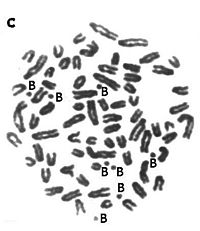
Photo from wikipedia
In various eukaryotes, supernumerary B chromosomes (Bs) are an optional genomic component that affect their integrity and functioning. In the present study, the impact of Bs on the current changes… Click to show full abstract
In various eukaryotes, supernumerary B chromosomes (Bs) are an optional genomic component that affect their integrity and functioning. In the present study, the impact of Bs on the current changes in the genome of goatgrass, Aegilops speltoides, was addressed. Individual plants from contrasting populations with and without Bs were explored using fluorescence in situ hybridization. In parallel, abundances of the Ty1-copia, Ty3-gypsy, and LINE retrotransposons (TEs), and the species-specific Spelt1 tandem repeat (TR) in vegetative and generative spike tissues were estimated by real-time quantitative PCR. The results revealed: (i) ectopic associations between Bs and the regular A chromosomes, and (ii) cell-specific rearrangements of Bs in both mitosis and microgametogenesis. Further, the copy numbers of TEs and TR varied significantly between (iii) genotypes and (iv) different spike tissues in the same plant(s). Finally, (v) in plants with and without Bs from different populations, genomic abundances and/or copy number dynamics of TEs and TR were similar. These findings indicate that fluctuations in TE and TR copy numbers are associated with DNA damage and repair processes during cell proliferation and differentiation, and ectopic recombination is one of the mechanisms by which Bs play a role in genome changes.
Journal Title: International Journal of Molecular Sciences
Year Published: 2020
Link to full text (if available)
Share on Social Media: Sign Up to like & get
recommendations!